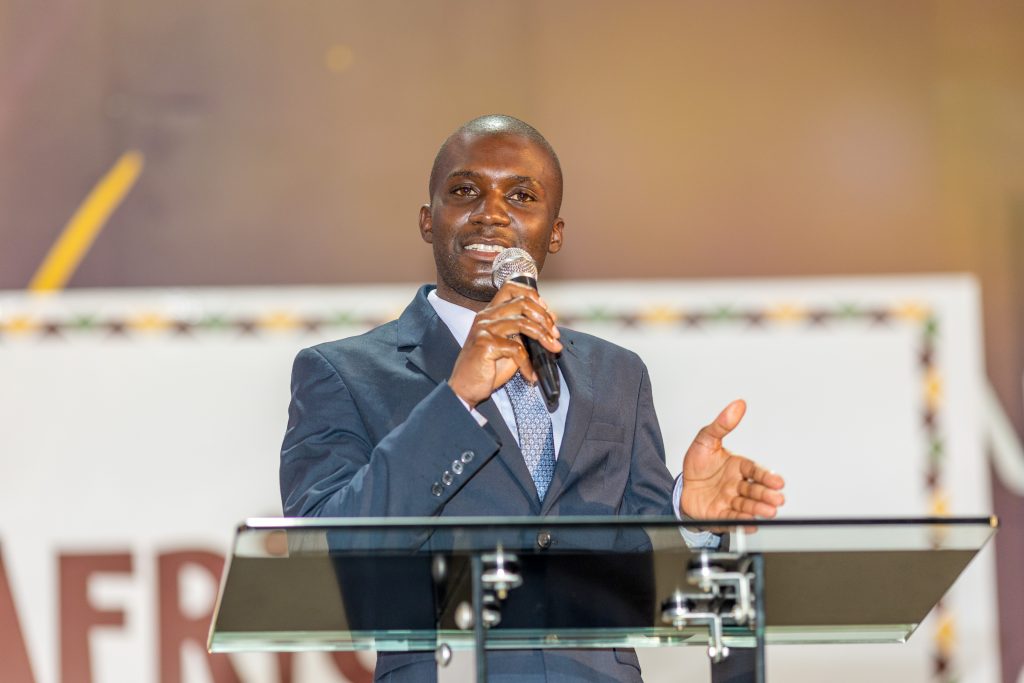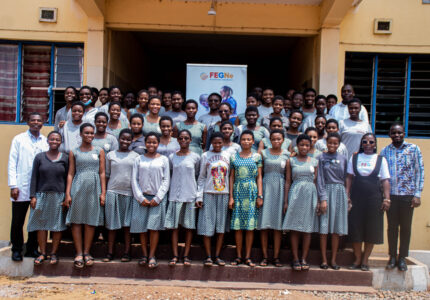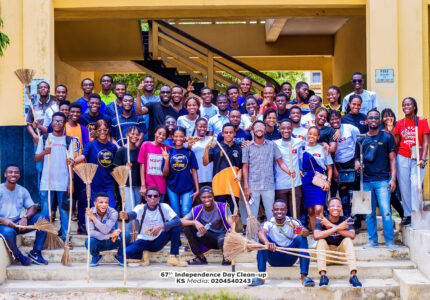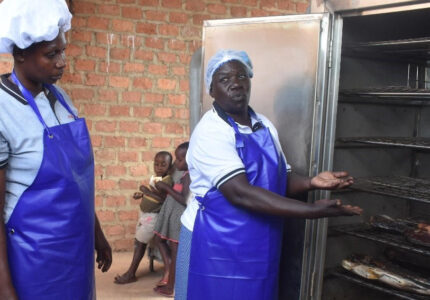The Zimbabwean entrepreneur changed the course of his life, as well as the lives of hundreds of thousands of young Africans.
As a young student in Zimbabwe, Knowledge Chikundi didn’t have a lot of opportunities to learn about STEM. So, through network-building, perseverance and more than a little audacity, he created those opportunities himself.
Described as a “one-man NGO”, Chikundi has built a grassroots movement to promote a love of maths and science to young innovators across Africa.
Using his own money and funding from governments and philanthropists, Chikundi founded Zimbabwe’s Science Fair and the Africa Science Buskers Festival – both annual events that showcase STEM thinking and innovation. Participants of these events are now engineers, researchers, entrepreneurs and science teachers, attending prestigious universities around the world and developing big ideas for global technology giants.
Chikundi is now driving the construction of Zimbabwe’s first Science Exploration Centre, a permanent home for science activities.
Growing up in Makunha, a village 120 km from Zimbabwe’s capital, Harare, Chikundi has loved science from a very young age. His teachers gave him the honorific title of “scientist” as a mark of his passion and potential. In 2011, when he left home to study science at a Harare high school, it was clear how much he had to learn.
“In the village, we had what was called ‘integrated science’, which touched on biology, chemistry and physics, but it was too shallow,” Chikundi recalls. “Pure physics and chemistry was new for me, and it was quite challenging.”
Working hard and usually on his own, Chikundi’s family members had a remedy for his social isolation: they put up posters advertising his skills as a maths tutor. Specialist teaching was rare in his then current location, a suburb in Harare; extra-curricular tutors were in demand.
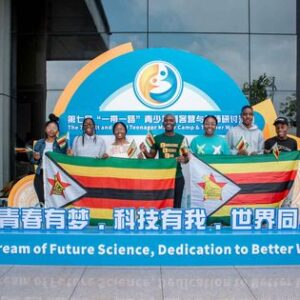
A garage full of maths students
“We were using a garage at home to teach,” says Chikundi. “At one point I had 40 students, and they did very well in the final national exams. I started getting more, including parents who had failed maths when they were in school, and in time I started teaching physics and chemistry.”
Chikundi’s passion for chemistry blossomed and, while still at high school, he pursued his own research projects with support from mentors at the University of Zimbabwe, in Harare. The internet hadn’t been available in his village, but with a windfall USD$30, he bought a Nokia phone and connected to the worldwide web for the first time.
“I watched a video of the International Science and Engineering Fair: this boy created a tool to detect pancreatic cancer in the early stages, and I said, ‘One day I’m going to help establish a science competition that will take Zimbabwean students to big international science competitions,’” says Chikundi.
Graduating from high school in 2012, Chikundi started a degree in chemistry at the University of Zimbabwe in August 2013. At the same time, he secured university and government backing for his ambitious plan for introduce a new hands-on STEM education programme to schools in Zimbabwe, taught by a team of 20 undergraduate engineering and medical students.
By the end of the programme’s first year, the pass rate for end-of-year science exams in the school Chikundi and his team visited rose from 56% in the previous year to 83%. The programme was in high demand and grew to cover two provinces of Zimbabwe and hundreds of schools.
“The [Zimbabwean] Ministry of Education’s director for the Harare province called me and said, ‘We see the impact of your programme. The students are being inspired, so what’s next?’” Chikundi recalls. “I told him, ‘Well, we now want to start a science fair.’”
Despite enthusiasm from powerful people, Chikundi ran into considerable obstacles to get his ideas off the ground. Resources remained limited – government finance was nearly non-existent, he says – so student volunteers were using their own money to run educational programmes and establish the science fair.
Chikundi refused to give up on the science fair. When Zimbabwean entrants were invited to be part of South Africa’s fair, he pounded pavements and wrote letters to secure funds for their travel. Australian embassy staff, impressed by his achievements and chutzpah, helped out with modest funding over several years.
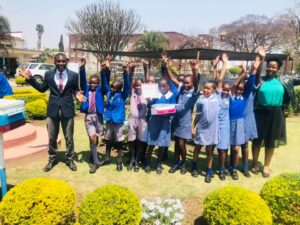
An Australian connection
On Facebook, Chikundi also connected with Dr Graham Walker, a science-communication teacher and researcher at the Australian National University’s National Centre for the Public Awareness of Science, in Canberra. Walker helped Chikundi’s team to develop science presentations and expand their horizons.
“Knowledge is a calm, humble young man – it’s amazing how young he is, considering what he has done. He has quite audacious ideas and he just chips away at them. He’s got the patience to make them happen,” says Walker.
“I work with partners all over the world and Knowledge is a bright spot who’s had huge impact. He’s run science competitions that have provided opportunities for elite students, but he’s been careful to have formats that are inclusive for everyone in Zimbabwe.”
Improved exam results are one measure of success, but genuine connection is another. After running a programme in a large school, performing science shows and conducting teacher workshops, Chikundi and his team received a bundle of thank-you notes from students.
“One student just wrote, ‘I want to be like you.’ A girl said, “I wanted to quit physics, but after this, I now want to stay in the physics class, and I want to be a big scientist when I grow up.’ It was so touching,” says Chikundi.
The Africa Science Buskers Festival began in 2017 as an event for primary and secondary students to share bite-sized presentations and ideas. It has since expanded beyond Zimbabwe, encouraging students from all over the world to develop their science communication skills in what is described as a “show-and-tell on any science topic, innovation or on original research.” In 2023, it was held as in-person and virtual event.
The Africa Science Buskers Festival is funded by the Broadcom Foundation, a STEM education organisation in California. For a decade, it has provided elite science students with an opportunity to develop more complex and ambitious projects for international competitions. It is an established path to success for African STEM enthusiasts and has already helped many to jobs and educational opportunities.
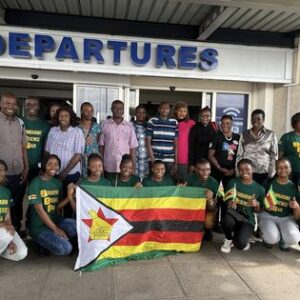
The Science Fair’s light bulb moment
In 2017, a high-school student from Harare named Pelagia Majoni entered the Zimbabwe Science Fair with a project once explored by American industrialist Henry Ford: she made a battery using decayed electrolytic potato paste to power a light bulb. Her invention qualified for the International Science and Engineering Fair, based in Washington DC, and won second prize. On the back of this success, Majoni was awarded a scholarship to study Computer Science with a minor in African studies at Haverford College in the USA, and officials at MIT and NASA named an asteroid in her honour – a first for an African woman.
“This year, Pelagia said, ‘I want to give back to the science fair because I am where I am because of it,’” says Knowledge. “So, she volunteers, mentoring students who are working on projects. Her employer Microsoft said they will donate $25 to us for every hour she spends mentoring a student in Zimbabwe.”
Walker, who coined the description “one-man NGO”, remains in awe of Chikundi’s impact.
“From the start, he struck me as someone who cared deeply about his community and Zimbabwe,” says Walker. “He saw the benefits that science and technology can bring, and not just for people with privilege. He sees it as part of development … as part of a flourishing human life.”
Follow Knowledge Chikundi on LinkedIn
Follow Science Buskers on Instagram | Website| Facebook | YouTube
Story by Kylie Ahern
This article was first published on thebrilliant.com

